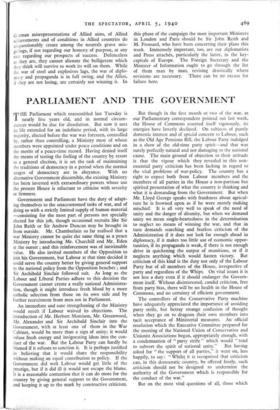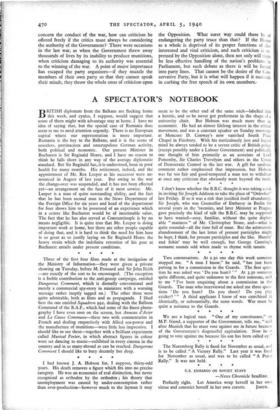PARLIAMENT AND THE GOVERNMENT
THE Parliament which reassembled last Tuesday is nearly five years old, and in normal circum- stances would be due for dissolution. But now it sees its life extended for an indefinite period, with its large majority, elected before the war was foreseen, controlled by, rather than controlling, a Ministry most of whose members were appointed under peace conditions and on the merits of a peace-time record. Having denied itself the means of testing the feeling of the country by resort to a general election, it is set the task of maintaining the traditions of democracy in a period when the normal usages of democracy are in abeyance. With no alternative Government discernible, the existing Ministry has been invested with extraordinary powers whose use the present House is reluctant to criticise with severity or firmness.
Government and Parliament have the duty of adapt- ing themselves to the unaccustomed tasks of war, and of doing so with a strictly limited supply of human material —consisting for the most part of persons not specially elected for this job, though occasional recruits like Sir John Reith or Sir Andrew Duncan may be brought in from outside. Mr. Chamberlain so far realised that a war Ministry cannot be quite the same thing as a peace Ministry by introducing Mr. Churchill and Mr. Eden at the outset ; and this reinforcement was of inestimable value. He also invited members of the Opposition to join his Government, but Labour at that time decided it could serve the country better by giving general support to the national policy from the Opposition benches ; and Sir Archibald Sinclair followed suit. As long as the Labour and Liberal Parties adhere to this decision the Government cannot create a really national Administra- tion, though it might introduce fresh blood by a more catholic selection from those on its own side and by further recruitment from men not in Parliament.
An immediate and sure strengthening of the Ministry would result if Labour waived its objections. The introduction of Mr. Herbert Morrison, Mr. Greenwood, Mr. Alexander and Sir Archibald Sinclair into the Government, with at least one of them in the War Cabinet, would be more than a sign of unity; it would infuse fresh energy and invigorating ideas into the con- duct of the war. But the Labour Party can hardly be blamed if it refuses to sanction it. It is perhaps justified in believing that it would share the responsibility without making an equal contribution to policy. If the Government did well Labour would get little of the prestige, but if it did ill it would not escape the blame. It is a reasonable contention that it can do more for the country by giving general support to the Government, and keeping it up to the mark by constructive criticism. But though in the first month or two of the war, as our Parliamentary correspondent pointed out last week, the House of Commons asserted itself vigorously, its energies have latterly declined. On subjects of purely domestic interest and of special concern to Labour, such as the Old Age Pensions Bill, the Labour Party indulged in a show of the old-time party spirit—and that was surely perfectly natural and not damaging to the national cause. The main ground of objection to their attitude is that the vigour which they revealed in this non- essential party criticism has been lacking in regard to the vital problems of war-policy. The country has a right to expect both from Labour members and the members of all parties in the House a non-partisan but spirited presentation of what the country is thinking and what it is demanding from the Government. But when Mr. Lloyd George speaks with frankness about agricul- ture he is frowned upon as if he were merely making mischief. It is all very well to speak of the need of unity and the danger of disunity, but when we demand unity we mean single-heartedness in the determination to neglect no means of winning the war, and that in turn demands searching and fearless criticism of the Administration if it does not look far enough ahead in diplomacy, if it makes too little use of economic oppor- tunities, if its propaganda is weak, if there is not enough drive in quickening the output of munitions, or if it neglects anything which would hasten victory. But criticism of this kind is the duty not only of the Labour Party but of all members of the House, irrespective of party and regardless of the Whips. On vital issues it is not less a duty even if it should endanger the Govern- ment itself. Without disinterested, candid criticism, free from party bias, there will be no health in the House of Commons, and no certainty of efficient government.
The controllers of the Conservative Party machine have adequately appreciated the importance of avoiding party strife, but betray strange confusion of thought when they go on to dragoon their own members into tacit acceptance of Ministerial measures. An official resolution which the Executive Committee prepared for the meeting of the National Union of Conservative and Unionist Associations began, appropriately enough, with a condemnation of " party strife " which would " tend to subvert the spirit of national unity." But having asked for " the support of all parties," it went on, less happily, to say : " Whilst it is recognised that criticism can, in this democratic country, be offered freely, such criticism should not be designed to undermine the authority of the Government which is responsible for the conduct of the war."
But on the most vital questions of all, those which concern the conduct of the war, how can criticism be offered freely if the critics must always be considering the authority of the Government? There were occasions in the last war, as when the Government threw away thousands of lives by its inability to produce munitions, when criticism damaging to its authority was essential to the winning of the war. A point of major importance has escaped the party organisers—if they muzzle the members of their own party so that they cannot speak their minds, they throw the whole onus of criticism upon the Opposition. What surer way could there be of endangering the party truce than that? If the House as a whole is deprived of its proper functions of dis- interested and vital criticism, and such criticism is ex pressed by the Opposition alone, then not only will there be less effective handling of the nation's problem, in Parliament, but such debate as there is will be forced into party lines. That cannot be the desire of the Con- servative Party, but it is what will happen if it succeeds in curbing the free speech of its own members..















































 Previous page
Previous page